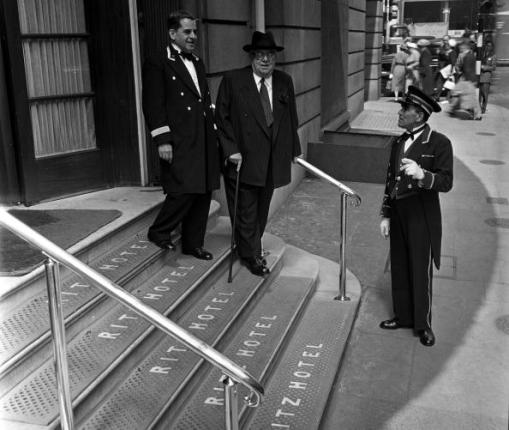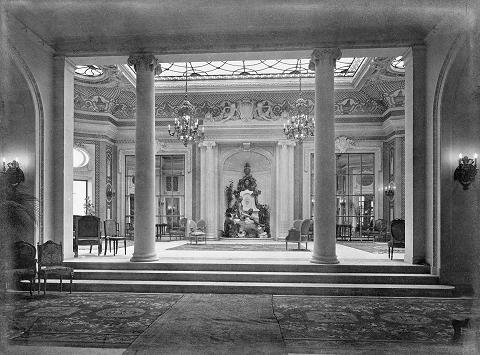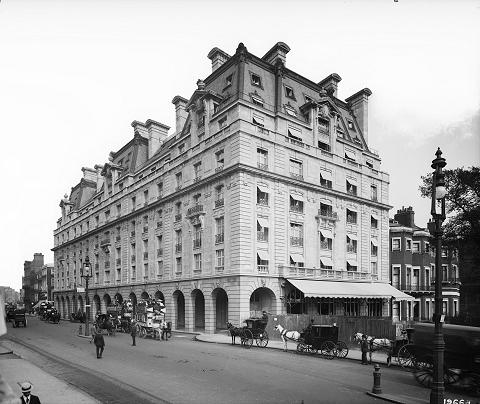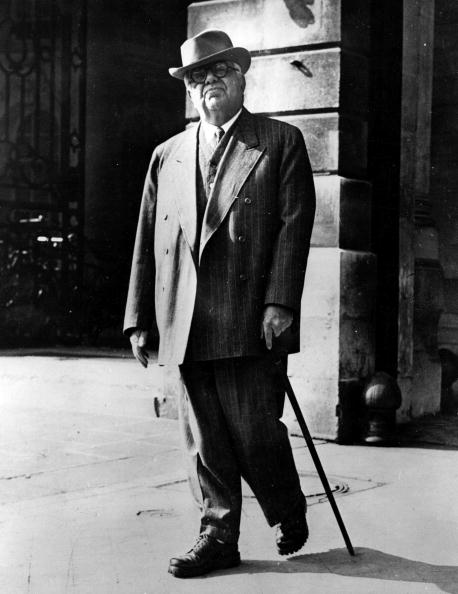As I sat waiting the call to his [the Aga Khan’s] suite, I could see why it was that His Highness was so popular with the hotel staff. The porters looked upon him as their special charge…Every mention of his name, was allied with something affectionate, something human…The drawing room in which His Highness received me looked more like the work-room of a busy philosopher….On a table were piled documents and books, and at the moment of my hesitating entrance, I noticed His Highness busy with his correspondence (Source: The Star of India, Calcutta, 12 June 1933)
Excerpts from a correspondent’s dispatch to Star of India, Calcutta, June 12, 1933
It is an unpardonable sin to fall back upon proverbs ….as the one about some people are born great, some become great and some have greatness thrust upon them.
And yet I cannot find anything better to describe His Highness the Aga Khan than to say that in his case His Highness has been born great and that he has become great and that greatness has been thrust upon him. It is a unique position that His Highness occupies in the world. His name is a household word in the three continents…the bright star of Aga Khan’s popularity is seen ever shining.
And this adulation is not confined to the followers of the Aga Khan to whom, of course, he appears in a far more divine light. Many must have pondered over the sway that His Highness has exercised over men of various religious, political and social classes. Many have envied him his wealth, his intelligence, and his learning, but few can wholly account for his eminence through any of these qualities.
When the Muslims are properly equipped with education there will be no power that can impede them in their march to their rightful place (Aga Khan III in a message to Muslims of Bengal when speaking to the correspondent)
It was not, therefore, in a confident mood that I presented myself to His Highness at the Ritz Hotel. The tempers of smaller men than the Aga Khan are known to be erratic. It was [the Persian poet] Sadi who said that the princes exalt the humble one day only to abase him the next. Caprice dictates their every act. The thing about the Aga Khan is that though he is a Prince, he is not capricious; though he is wealthy, he is not arrogant or extravagant; though he is a religious head, he is not fanatic; though he has power, he meets a humble man on equal terms.

His Highness the Aga Khan was popular with the Ritz hotel staff. The porters looked upon him as their special charge. Here he is seen pictured with the Greek head porter Georges Faroutakis (left) at the Ritz Hotel, London, in 1950 (Photo by Popperfoto/Getty Images, Copyright)
The Ritz Hotel to the Indians is known as the place where the Aga Khan stays. His Highness has a suite which is permanently associated with his name.
As I sat waiting the call to his suite, I could see why it was that His Highness was so popular with the hotel staff. The porters looked upon him as their special charge; I was almost going to say as a member of their own family. Every mention of his name, and mostly it was in French, was allied with something affectionate, something human.
The Aga Khan was not just a client staying at the hotel, like so many hundreds of others. He was one who was interested in them and who was as solicitous of their welfare as they were in duty bound to be of his.
‘‘The Aga Khan has sent my boy to a college’, confides one to me.
‘The Aga Khan always asks about my wife who has been ill so long’, says the other.
And how many men in much humbler walks of life can find time for such things, or have the inclination to bother about them?

1906, “The Palm Court”, The Ritz, London. Photo: Archives of the Ritz, London, Copyright.
Treading on silken Persian carpets, my feet sinking into their softness and my heart sinking into my shoes, I left the gorgeous vestibule of the hotel in company with a perky young man, smartly dressed, who called himself a page. The lift went up gracefully. There was no vulgar hurry in that palatial building.
Still following the gentle hints as to the direction from my confident guide, I found myself lost in the maze of corridors, where hung crystal chandeliers and soft lights peeped in from the concealed lighting system.
His Highness’s suite was ultimately reached and my reverie ended. The charm seemed, however, to grow more potent, and the nearness of His Highness seemed to exude from the place. Unostentatious and simple was the furniture of the place. It was decorated with that care which, by its very simplicity, is all the more impressive. The Islamic severity and austerity were imprinted on the spareness of the rich colours.
Not more than a minute had elapsed before I was at my ease and talking to him with a freedom of thought and expression I had not imagined possible.
The drawing room in which His Highness received me looked more like the work-room of a busy philosopher than the room of the Prince whose name is to be conjured with in the racing and sporting world. On a table were piled documents and books, and at the moment of my hesitating entrance, I noticed His Highness busy with his correspondence. But that engrossment did not prevent him from rising from his seat and greeting me, true Muslim-wise, with As-Salaam-u-Alaikum, and from his offering me most courteously a seat near him. I was lucky in finding His Highness alone. Not more than a minute had elapsed before I was at my ease and talking to him with a freedom of thought and expression I had not imagined possible.
As His Highness sat there, I cast a glance at him. Here was a massive head, broad shoulders and a strong frame. He was if anything more serious than at the other occasions I had caught a glimpse of him. And yet in his eyes was a glow of satisfaction as if he had, though after a great deal of effort, at last achieved results that satisfied him. I asked His Highness to give me a message to the Muslims of Bengal.”
[The following, in italics, are excerpts of the message]:
The importance of Bengal Muslims has only recently come to be fully appreciated. I have always held that the Muslims there are equal in importance for the cause of the Faith that they profess to the Muslims of all the Provinces put together. Bengal Muslims have now a very great opportunity to prove to the world that the efforts that we, as their spokesmen, have made in this country have not been in vain and that they are alive to the needs of modern times.
The Bengal Muslims have been maligned as backward in education. Now is the time for them to use the power in the government that the reforms are bound to give them to remove the stigma of being backward in education. Private efforts can never combat illiteracy. In this country the right of every man for a free and useful education is recognized and respected. And in Bengal, too, there must be education by the State for all, and not restricted to those who can afford to pay.
Bengal is the brightest Islamic jewel and it is up to the Bengali Muslim to prove that it is so still, and will continue to be.
When the Muslims are properly equipped with education there will be no power that can impede them in their march to their rightful place.
The Bengal Muslims hold the key to the entire Islamic problem. If they can come out successful and strong, the difficulties of the whole of Muslim India will be solved. They are at the far-end of India and theirs is a great responsibility…”
Continuation of the correspondent’s dispatch:
Let no one run away with the idea that His Highness spoke continually. There were pauses; there was emphasis laid; there were my questions and there was, above all, the calm mind of a clear-thinking and wise man behind these words. It shows how much His Highness moves with the times for him to exhibit the true value of journals in modern life [sic]. Here in this country one sees so many examples of the might and the power of the press that one wonders how it was ever possible in days gone by to do without newspapers.
A man who can personally see to his enormous racing studs, write articles and books, deliver speeches, and conduct the affairs of one of the most wealthy communities… and his own enormous personal estates, and all of them with great success must be possessed of an exceptionally active brain and a great fund of human sympathy and understanding.
_______________
Notes
1. Article Source: Star of India, Calcutta, 12 June 1933. The evening paper began publication on 19 January 1933 by the Muslim Press and Publications and played a crucial role in moulding the Muslim mind because of its high editorial and production standards. It had better news coverage than any other Indian Muslim newspaper. It brought to its readers the latest news of the day and reproduced significant articles, editorials and letters to the editor which appeared in other papers around India.
2. All photos shown above are copyright and published in this website under a licensing agreement with Getty Images and The Ritz, London as applicable. The copyright owner is noted in the captions.
3. Notations within square brackets [ ] are by Simerg.
4. The correspondent’s dispatch and the Aga Khan’s message to Bengal is published in full in Aga Khan III Selected Speeches and Writings of Sir Sultan Muhammad Shah, Ed. K.K. Aziz, Volume II, pages 927-930, pub.Kegan and Paul, 1997.
________________
A note to all readers:
Please visit the What’s New page for all articles posted in this website, including the ones in the Aga Khan III series.
And do visit the Home page if you are visiting the website for the first time.



